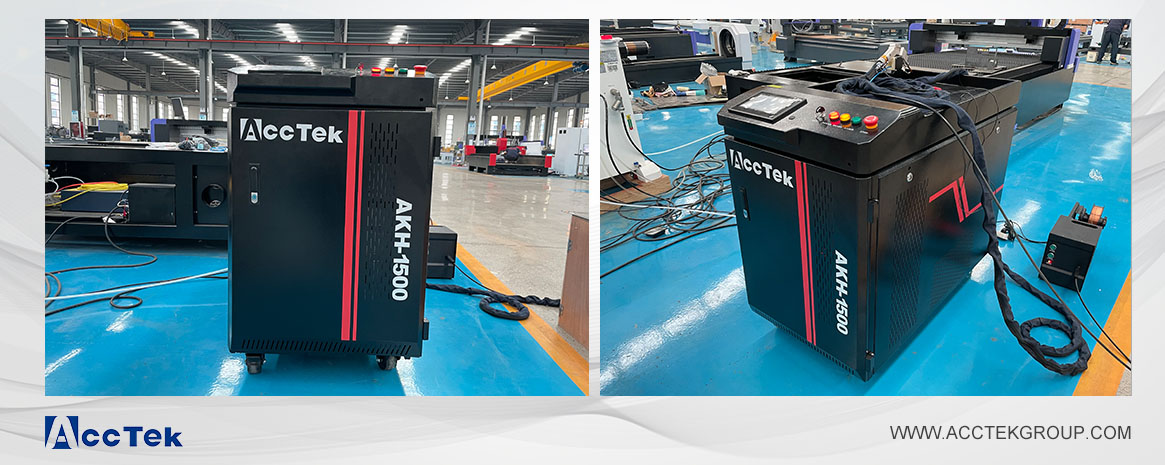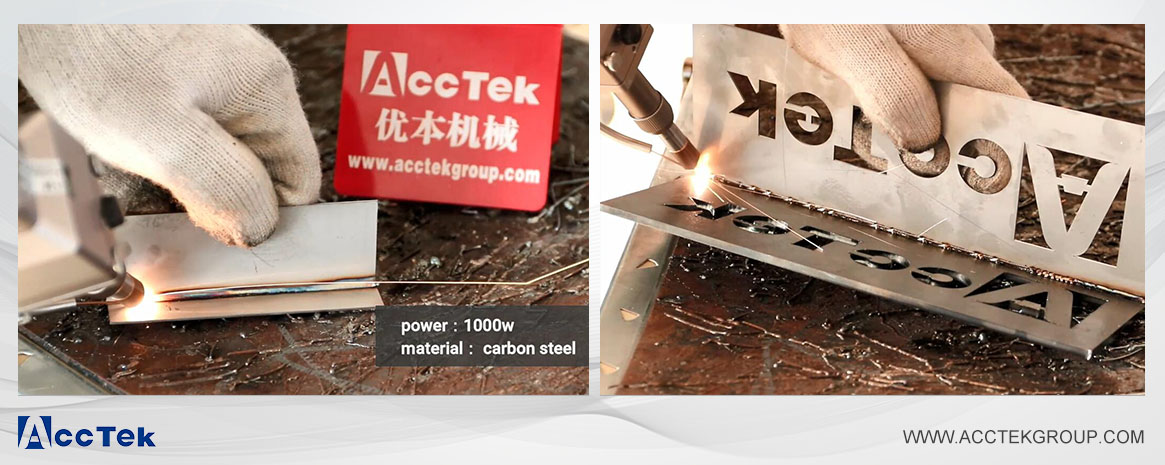Advantages and Applications of Laser Welding Machine
![[field:title /]](https://www.acctekgroup.com/templets/youben/images/shijian.png)
![[field:title /]](https://www.acctekgroup.com/templets/youben/images/zuozhe.png)
![[field:title /]](https://www.acctekgroup.com/templets/youben/images/cishu.png)
This post introduces the advantages and applications of fiber laser welding machine, so that you can better understand the characteristics of laser welding technology.
In recent years, laser welding machines have become more and more popular with metal product manufacturers. Because like laser cutting, many advantages of laser welding are being recognized and utilized to produce better products with higher production efficiency and lower cost. Laser welding technology is a universal and cost-effective method for joining metal materials.
Laser welding technology is a non-contact and high power density welding process that connects multiple pieces of metal materials together by using the energy emitted by a laser beam. Stainless steel kitchenware, environmental protection equipment, auto parts, etc. are some common areas where laser welding technology is widely used. This post introduces the advantages and applications of fiber laser welding machine, so that you can better understand the characteristics of laser welding technology.
Faster welding speed: Laser welding is a very fast technique. Depending on the type and power of laser used, thin section materials can be welded at speeds of many metres a minute.
Weld strength: The laser weld is narrow with an excellent depth-to-width ratio and higher strength.
Heat affected zone: The heat affected zone is limited, and due to rapid cooling, the surrounding material is not annealed.
Precision work: The small, tightly controlled laser beam permits accurate micro-welding of miniature components.
Deformation: Parts have minimal deformity or shrink.
No contact: No physical contact between the material and laser head.
One sided welding: Laser welding can replace spot welding requiring access from one side only.
Scrap: Laser welding is controllable and generates low volumes of scrap.
Suitable for a range metal materials and thicknesses: With lasers, many different materials can be welded or joined, including steels, stainless steels, Al, Ti and Ni alloys. Furthermore, taking the example of steels, the thickness of the material that can be welded can be anything from under a millimetre to around 30mm , depending on the type and power of laser used.
Precision parts: Lasers are excellent for welding fine and delicate metal components and generating minimal internal stresses due to the minimal heat input.
Medical devices: Non-contact welding and no welding splatter ensures hygiene when welding medical devices.
Machined items: Lasers are ideal for joining machined components, and create minimal distortion due to the low heat input.
High value items: The precise controllability and negligible heating effects make it a good choice for welding high value, high precision parts.
ACCTEK fiber laser welding machine adopts hand-held welding head, which has the characteristics of no consumables, small size, flexible processing, and low operation and maintenance cost. If you need to know more, you can communicate online.
Laser welding technology is a non-contact and high power density welding process that connects multiple pieces of metal materials together by using the energy emitted by a laser beam. Stainless steel kitchenware, environmental protection equipment, auto parts, etc. are some common areas where laser welding technology is widely used. This post introduces the advantages and applications of fiber laser welding machine, so that you can better understand the characteristics of laser welding technology.
Compared with traditional welding methods, the precise control of laser welding machine provides users with a number of advantages:
Faster welding speed: Laser welding is a very fast technique. Depending on the type and power of laser used, thin section materials can be welded at speeds of many metres a minute.
Weld strength: The laser weld is narrow with an excellent depth-to-width ratio and higher strength.
Heat affected zone: The heat affected zone is limited, and due to rapid cooling, the surrounding material is not annealed.
Precision work: The small, tightly controlled laser beam permits accurate micro-welding of miniature components.
Deformation: Parts have minimal deformity or shrink.
No contact: No physical contact between the material and laser head.
One sided welding: Laser welding can replace spot welding requiring access from one side only.
Scrap: Laser welding is controllable and generates low volumes of scrap.
Suitable for a range metal materials and thicknesses: With lasers, many different materials can be welded or joined, including steels, stainless steels, Al, Ti and Ni alloys. Furthermore, taking the example of steels, the thickness of the material that can be welded can be anything from under a millimetre to around 30mm , depending on the type and power of laser used.
The unique properties of laser welding give it a significant advantage over other forms of welding that can be exploited in several ways:
Precision parts: Lasers are excellent for welding fine and delicate metal components and generating minimal internal stresses due to the minimal heat input.
Medical devices: Non-contact welding and no welding splatter ensures hygiene when welding medical devices.
Machined items: Lasers are ideal for joining machined components, and create minimal distortion due to the low heat input.
High value items: The precise controllability and negligible heating effects make it a good choice for welding high value, high precision parts.
ACCTEK fiber laser welding machine adopts hand-held welding head, which has the characteristics of no consumables, small size, flexible processing, and low operation and maintenance cost. If you need to know more, you can communicate online.
Product Directory
Copyright © Jinan AccTek Machinery Co.,Ltd


